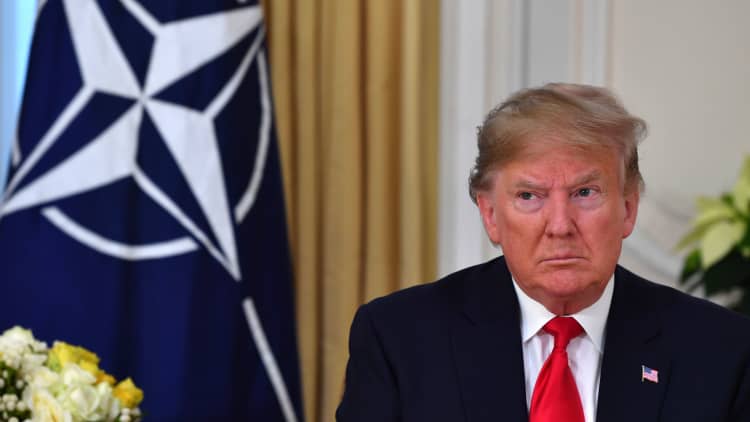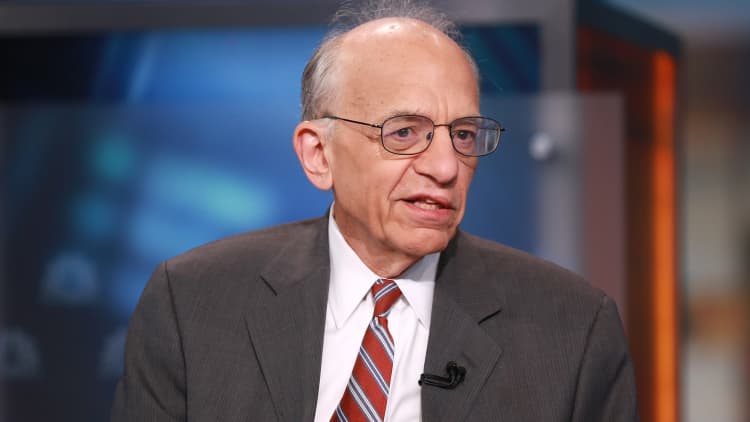President Trump's comment that he had no deadline on a China deal has predictably thrown markets into a tizzy, as the self-imposed deadline of Dec. 15 for additional tariffs is now less than two weeks away.
The market is now grappling with the likelihood of no trade deal, but the critical issue is tariffs. I asked UBS Art Cashin if traders would be satisfied with 1) no new tariffs on Dec. 15, 2) keeping additional tariffs, and 3) no deal going into the new year.
"I don't think it would cause a big swing one way or another," he said. "I think they would say, obviously negotiations are still going on. The reason you've had two pretty significant down days is, people were believing there would be a deal by the end of the year. Now, that's clearly in doubt and that's where we're going."

If additional tariffs are put on Dec. 15, that is a different story: "Then there's another sell-off. If they put on additional tariffs and he bumps them by 10% or 15%, a sell-off but nothing severe. 50% or something like that? Better put on your helmet," Cashin said.
Apple, which is down 3.5% this week and which has a huge manufacturing footprint in China around its iPhone, is particularly susceptible to an escalation in the trade war, according to Dan Ives at Wedbush.
"The most important question for investors is if Apple will be exempt from the next wave of tariffs that could hit on Dec. 15 if a phase one agreement does not come and thus remains an ominous date and line in the sand for US tech vendors," he said.
Despite signs that even a so-called phase one trade deal might not be achieved, bulls are still holding out the prospects that the markets might be mollified by some sign — any sign — that talks are continuing.
Under this scenario, it's hoped that Chinese officials might still extend an offer to visit Beijing, a position held by Ed Mills, Washington Policy Strategist for Raymond James.
"If a trip takes place, it could be announced sometime late this week for negotiations mid-to-late next week," he said. "This could provide an opportunity for officials to rebuild good faith around avoiding the Dec. 15 tariffs."
Mills even holds out hope for a reset in U.S.-China relations in 2020.
"Alternatively, direct intervention by Trump and Xi following a phone call may further extend the current tariff schedule," he said. "There is speculation that the Nov. APEC summit could be rescheduled for some time in Jan., and an agreement of a one-month tariff delay by the two leaders would better align negotiations to such a timeline. This delay could be beneficial for both sides as it would likely see a decrease of Congressional attention on human rights issues given expected end of year actions on government funding, impeachment, and ultimately recess for the winter holidays, which could provide ample time to reset the U.S.-China relationship heading into 2020."
As the expectations for a trade deal diminish and the bar gets set lower and lower, some are finally starting to look at the long-run implications of this dispute, and that it may be a permanent part of U.S.-China relations.
Evercore ISI analyst Jaewoo Nakajima recently surveyed Taiwan supply contractors.

"Every company contact in Taiwan was definitely skeptical of a US-China trade deal, with the majority believing that trade tensions between the US and China will persist for years," he concluded.
"From Taiwanese companies' viewpoint, even if there's a rollback of tariffs, differences are irreconcilable between the US and China on fundamental economic issues such as intellectual property protection, Chinese govt subsidies to Chinese manufacturers, and discriminatory market access for foreign enterprises," he said. "Because many believe trade tensions will persist for years (and their implied assumption is that Trump will be re-elected in 2020), Taiwanese companies spoke of a 'decentralized manufacturing' and 'two supply-chain systems.' In the long run: There will be two dominant supply-chains in the world, one that's US-centric and another China-centric."


